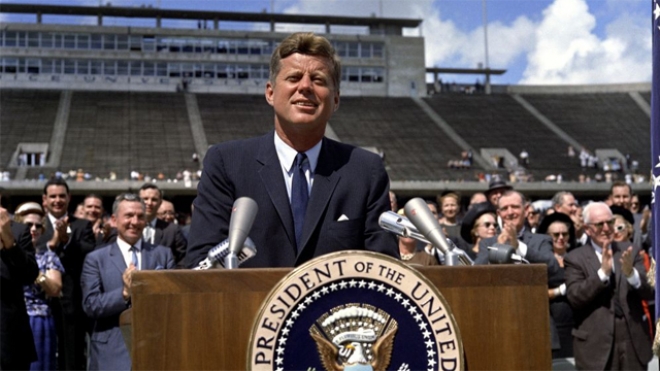Fifty-Three years ago today on September 12, 1962, President Kennedy delivered his speech “We choose to go to the moon” before a crowd of 35,000 people in the Rice University football stadium, Houston, Texas. In this speech JFK introduced the audience to one of humankind’s greatest ever quests. It was a quest that changed the world forever.
I’m intrigued by the power of the leader’s quest and how quests can change the course of history. So over the past 18 months I’ve been researching some of the most important quests to understand their DNA and understand why they are so powerful and motivating. It has become a quest of my own and is culminating in the launch of my new book Quest: The Force Behind Change scheduled to be published in late November.
Quest is a book about questers – people and organisations who embarked on audacious adventures to build a better future. It shares their amazing, inspirational and even magical stories and provides a framework for embarking on quests of your own.
Quests propel civilisations forward and I want to show why they are at the very centre of personal and professional success. Questers embark on journeys that shape and influence the future. Questers by their very nature are disruptors. So each chapter in the book tells an inspirational story of a different organisation or person who had a bold idea and embarked on a quest that made a difference to the lives of people and the world around them.
Quests are journeys, adventures into the unknown. They strive to achieve the impossible, they promise to deliver significant meaningful difference and they offer a target destination to rally the questers who heed its call. These are the three qualities of a quest: Impossible, meaningful difference, target destination.
In the “We choose to go to the moon” speech, JFK articulates all three qualities of a quest. The importance of striving to achieve the impossible: “Its hazards are hostile to us all. Its conquest deserves the best of all mankind.” The meaningful benefits that will ensue: “We set sail on this new sea because there is new knowledge to be gained, and new rights to be won, and they must be won and used for the progress of all people.” And, the President set a very clear and objective target destination devoid of any ambiguity: “We choose to go to the Moon in this decade.”
If you are interested in learn more about how the power of the quest can benefit your leaders and your orgainstion please contact [email protected]
If you or your organisation are on a bold and audacious quest please let us know by commenting below or contacting [email protected]
Here is an extract from JFK’s most motivating and inspiring quest:
“We set sail on this new sea because there is new knowledge to be gained, and new rights to be won, and they must be won and used for the progress of all people. For space science, like nuclear science and all technology, has no conscience of its own. Whether it will become a force for good or ill depends on man, and only if the United States occupies a position of pre-eminence can we help decide whether this new ocean will be a sea of peace or a new terrifying theater of war. I do not say that we should or will go unprotected against the hostile misuse of space any more than we go unprotected against the hostile use of land or sea, but I do say that space can be explored and mastered without feeding the fires of war, without repeating the mistakes that man has made in extending his writ around this globe of ours.
There is no strife, no prejudice, no national conflict in outer space as yet. Its hazards are hostile to us all. Its conquest deserves the best of all mankind, and its opportunity for peaceful cooperation may never come again. But why, some say, the Moon? Why choose this as our goal? And they may well ask, why climb the highest mountain? Why, 35 years ago, fly the Atlantic? …
We choose to go to the Moon! …We choose to go to the Moon in this decade and do the other things, not because they are easy, but because they are hard; because that goal will serve to organize and measure the best of our energies and skills, because that challenge is one that we are willing to accept, one we are unwilling to postpone, andone we intend to win …”



